Timeline
1921
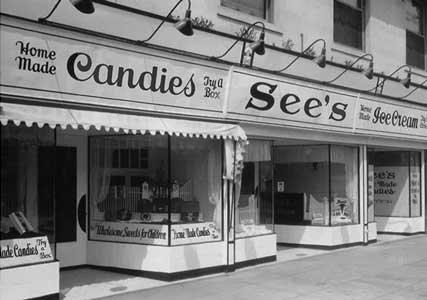
1921
Charles See Opens His First Shop

With dreams of starting his own candy company in sunny California, Canadian chocolate salesman Charles A. See moved to Los Angeles with his family and widowed mother, Mary See. There, at 135 Western Avenue North, he opened the first See’s shop, selling Mary’s delicious confections made from her own original recipes.
1925
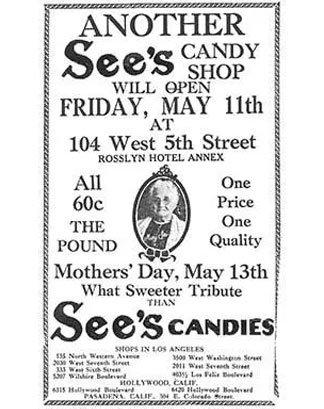
1925
Expanding Across Los Angeles

By 1925, there were a dozen See’s chocolate shops across Los Angeles, including a location in the famous Grauman’s Chinese Theater building.
1928
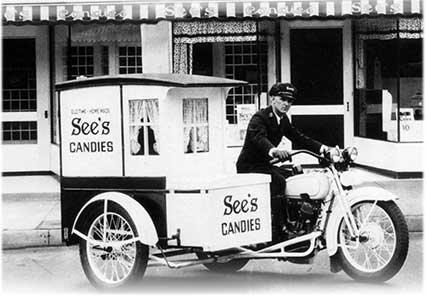
1928
Door-to-Door Delivery

Motorcycle delivery service started in LA when Hugh Fry, a shipping clerk, would don a chauffeur’s uniform and hop on a customized Harley to deliver See’s around town. Customers included many Hollywood celebrities and movie stars!
1929
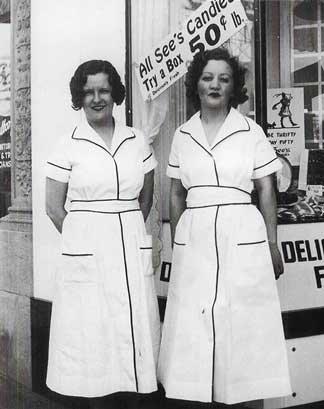
1929
The Great Depression

With so many Americans out of work, the Depression was a difficult time for businesses. See's competitors were still selling candy at 80¢ per pound, and many were forced to close their doors. Charles See managed to reduce his prices without depleting the bottom line, charging only 42¢ a pound for pre-paid orders over 50 lbs. This innovative idea was the basis for our modern-day Volume Discounts pricing.
1931
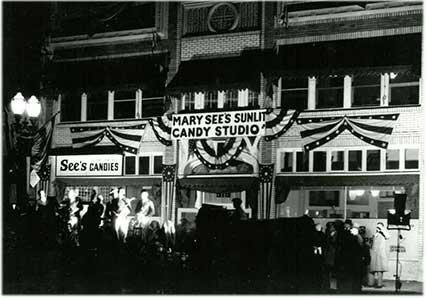
1931
Sunlit Candy Studio

Despite the tough economy, Charles See forged ahead with plans to debut "Mary See’s Sunlit Candy Studio," a See’s chocolate shop and kitchen where customers could watch through giant plate-glass windows as See’s confections were created using state-of-the-art equipment. Hollywood celebrities and eager crowds converged on the studio for an open house on November 24th, 1931.
1936
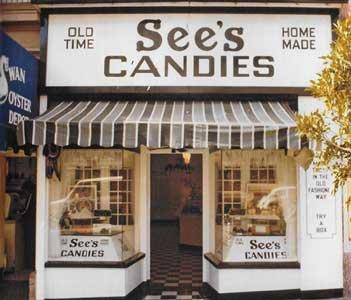
1936
Welcome To San Francisco

Though competitors were closing stores elsewhere, Charles sent his sales manager to San Francisco on a mission to open new shops, expanding See’s operations outside Los Angeles for the first time. Within four years, there were 18 "Mary See’s Dainty White Shops" all over the Bay Area.
1939
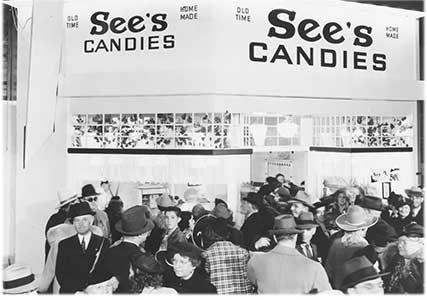
1939
San Francisco World’s Fair

Visitors to the 1939 World’s Fair were captivated by an exhibit showcasing a See’s Candies shop and miniature Candy Kitchen where they could watch candy makers hand-dip Scotch Kisses and Bon Bons. Thousands of visitors from across the country got their first taste of See’s, and candy sales were phenomenal. The event helped establish the brand as a household name.
1940
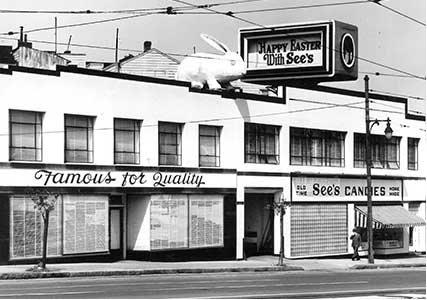
1940
State-of-the-Art Candy Kitchen

See’s opened an amazing 15,000-square-foot Candy Kitchen on the corner of Market and Valencia in San Francisco. Radio spots and newspaper ads invited the public to tour the building, taste the candy and enjoy modern amenities like air conditioning. More than 8,000 people attended the grand opening.
1942
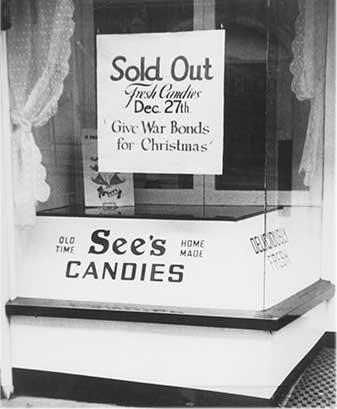
1942
WWII Rationing

During the war, many raw ingredients such as butter, sugar and cream were rationed and in extremely short supply. There were heated discussions within the company as to how See’s could stay in business without compromising on the quality of the recipes. In the end, they took a risk on a clever idea: using the best ingredients, but producing less candy. When a shop ran out after a few hours of sales, the shop closed for the day. The plan worked—customers were willing to wait in long lines to buy their candy from See’s, knowing that the company had kept their promise of quality.
1949
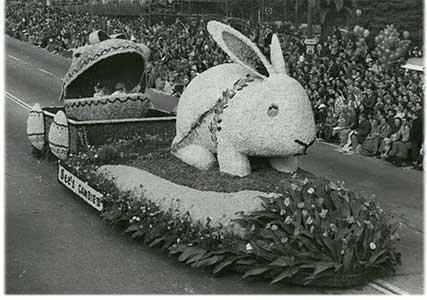
1949
Laurance See & the Rose Bowl Parade

Laurance See was just nine years old when his father founded See’s Candies. After graduating from Stanford University, Laurance soon became See’s General Manager. In 1949, following three years of military service overseas, he returned to succeed his father as president. Laurance ensured that See’s jumped on the television bandwagon early, securing opportunities like the nationally televised Rose Bowl Parade, to bring See’s into living rooms across the country. The company’s first float in the Rose Bowl Parade featured a 15-foot Easter Bunny pulling a cart with revolving Easter egg wheels and was televised on New Year’s Day.
1951
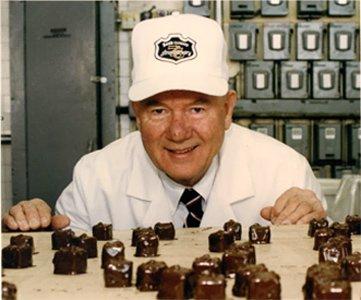
1951
Chuck Huggins is Hired

Joining the company in April of 1951 was one of the luckiest days of his life, according to Chuck Huggins. In the following years, he learned "See’s version of how to run a quality candy business" inside and out, accepting various challenges and responsibilities as the company grew. When the opportunity arose, he was asked to run See’s Candies as CEO, though he preferred to think of himself as "Chief Candy Taster." He continued to lead the company for 34 years.
1952
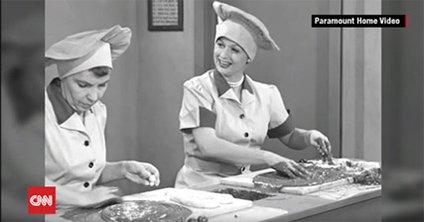
1952
Lucy Loves See’s

Lucille Ball (Lucy) and Vivian Vance (Ethel) visited the See’s Candy Kitchen on La Cienega Boulevard to learn the art of dipping and packing chocolates. Their experience inspired the iconic "Job Switching" episode of “I Love Lucy,” one of the most beloved moments in television history.
1959
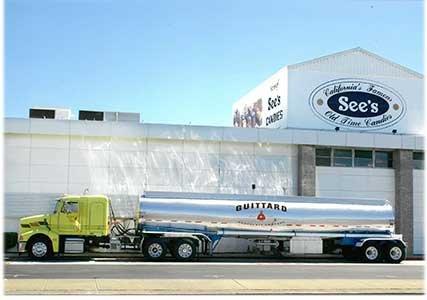
1959
Trucks Full of Chocolate

See’s was the first company to come up with the idea of having chocolate delivered by a tanker truck in liquid form—all melted and ready to use! Chocolate is still delivered to the See’s Kitchens in this way today.
1960
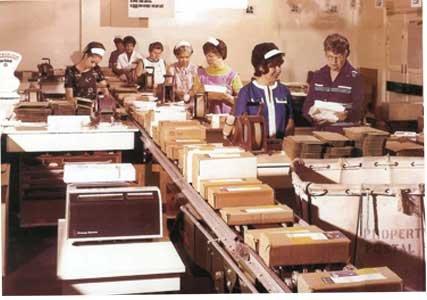
1960
Growing Across California

By the end of the 1950s, See’s had expanded to 124 shops in California, employing over 1,000 people. See’s continued to expand over the next decade, including the development of a first-rate Mail Order department where candy was carefully packed and shipped out to customers. Little did they know back then—this was only the beginning of the company’s delicious expansion!
1961
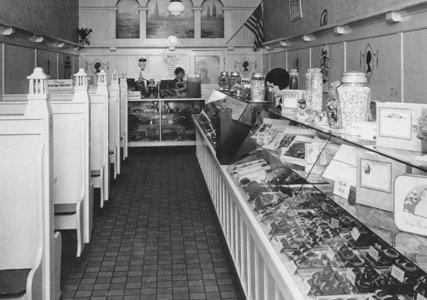
1961
First Shop Outside California

Laurance See figured that Phoenix might be the next region to experience a big population spike, and he was right. See’s opened a shop in a mall in Phoenix—the first See’s chocolate shop outside of California.
1972
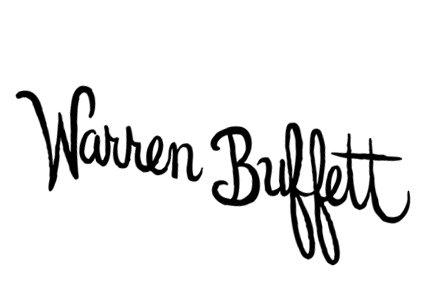
1972
Hello, Berkshire Hathaway!

See's Candies became part of the Berkshire Hathaway family in January 1972, when Warren Buffett and Charlie Munger purchased the company. To this day, See’s is one of Warren's favorite businesses! In fact, he loves his See’s Candies Peanut Brittle so much that he enjoys it in front of thousands of shareholders every year, while speaking at the annual Berkshire Hathaway Shareholders Meeting.
1976
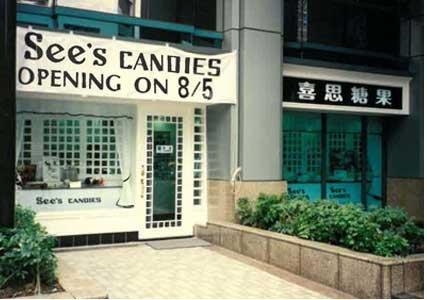
1976
First International Shop

Firecrackers and a Chinese Lion Dance marked the grand opening of the first international See’s Candies shop, located in the Ocean Terminal shopping plaza in Kowloon, Hong Kong. The shop is still open for business today.
1985
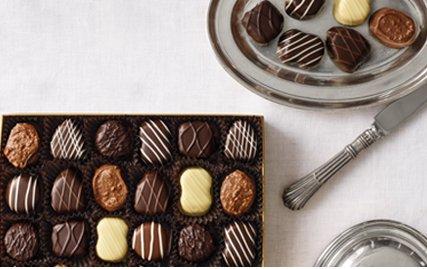
1985
Time For Truffles!

In December of 1985, after many years of development, See’s finally perfected the truffle recipe and began offering these silky-smooth confections in shops. Loyal See’s truffle customers still can't get enough!
1995
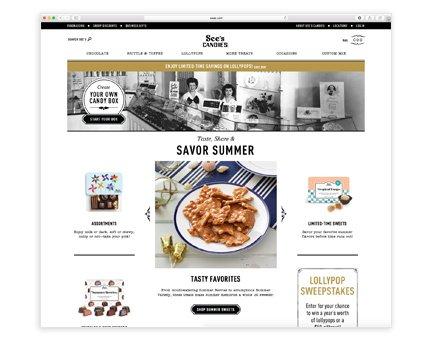
1995
Online Shop Opens

See’s launched a brand-new website featuring a full-service online store, allowing customers to shop from around the world. To this day, See’s Candies fans can enjoy their favorite chocolates and candies delivered straight to their doorstep.
1996
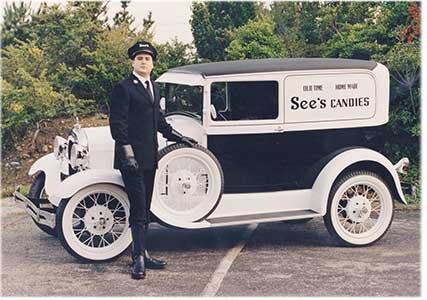
1996
75th Anniversary

To celebrate See’s Candies' 75th anniversary, vintage delivery vehicles were displayed on a roadshow across California.
1998
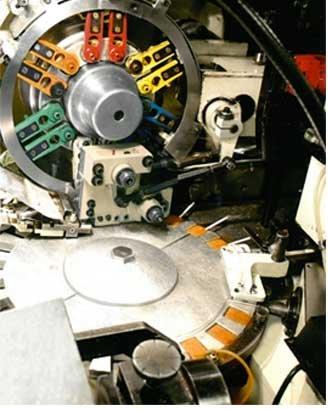
1998
The Lollypop Guild

See’s opened a Candy Kitchen at Rollins Road in Burlingame, California, dedicated to making Lollypops and Little Pops®. From classic Butterscotch to seasonal Root Beer, all of See’s Lollypop flavors are still produced in this Candy Kitchen.
2006
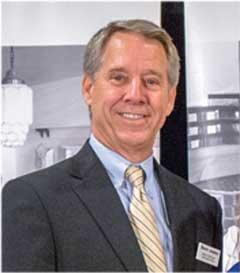
2006
Brad Kinstler Becomes CEO

Brad Kinstler joined as President and CEO of See’s Candies after Chuck Huggins retired. A longtime member of the Berkshire Hathaway family, Brad served as President of Cypress Insurance Company and President and CEO of Fechheimer Brothers, Inc. before leading See’s Candies for 13 years until his retirement in 2019. Thanks to his vision and tireless dedication, See’s maintains its standing as one of the most beloved brands in America.
2012
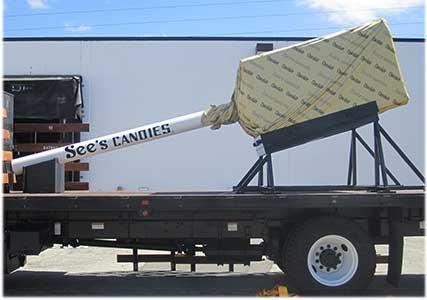
2012
World’s Largest Lollypop

On July 18, Guinness World Records declared See’s Chocolate Lollypop the World's Largest. The giant confection, weighing over 7,000 pounds, was equal to 145,000 normal See's Lollypops!
2014
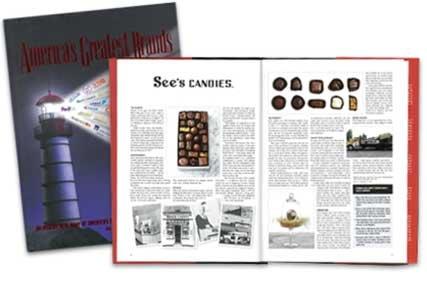
2014
One of America’s Greatest Brands

In 2014, See’s was named by Fortune as one of the 13 most American companies and included in vol. 11 of America’s Greatest Brands, a prestigious list of companies that have earned the unwavering support of American consumers. See’s core values of taste, quality, tradition and service were named as the basis of its success—values that were instilled by Mary See herself.
2019
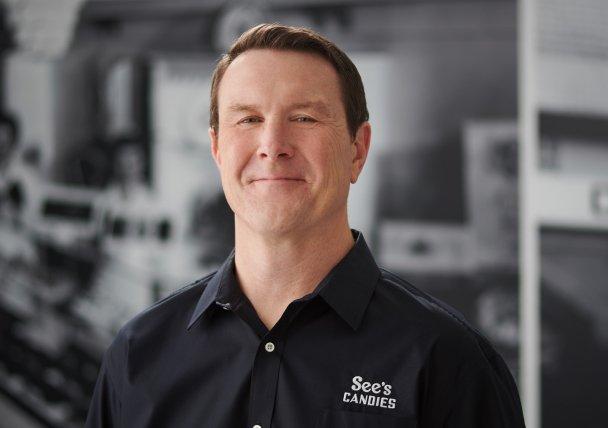
2019
Pat Egan Becomes CEO

Pat Egan joined See’s Candies as President and CEO after Brad Kinstler retired. With 12 years of Berkshire Hathaway experience, Pat served as SVP of Customer Operations at NV Energy and VP of Customer and Community Affairs at Pacific Power. A lifelong See’s fan, he has built upon the company’s rich history with a focus on exceptional quality and a commitment to treating employees and customers like family.
2021
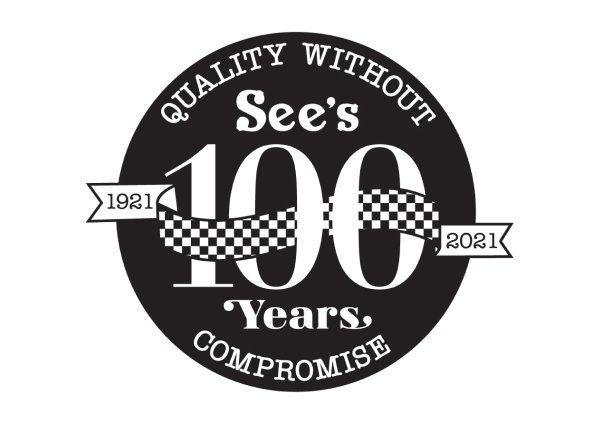
2021
See’s Turns 100!

See’s marked a century of American-made deliciousness with its showstopping centennial celebration. Each month, they introduced a new limited-time flavor, including Holiday Bordeaux™, Milk Raspberry Heart Truffles and more favorites that are still sold today. Customers were also invited to submit suggestions for new candies in See’s “What’s Your Sweet Idea?” contest. (Spoiler: Dark Coffee Scotchmallow® won!).
Today
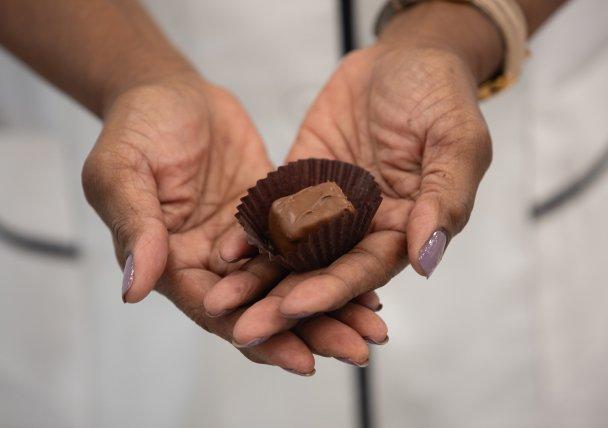
Today
See’s Candies Today

For over 100 years, See’s Candies has made the world a sweeter place, one delicious bite at a time. Without ever compromising on quality, taste or customer service, the company has grown from one shop to over 250 across America — not to mention, a flourishing online store. Dedicated to making candy the Mary See way, See’s still uses many of her original recipes, like Peanut Brittle, Victoria Toffee, hand-dipped Bon Bons and more.